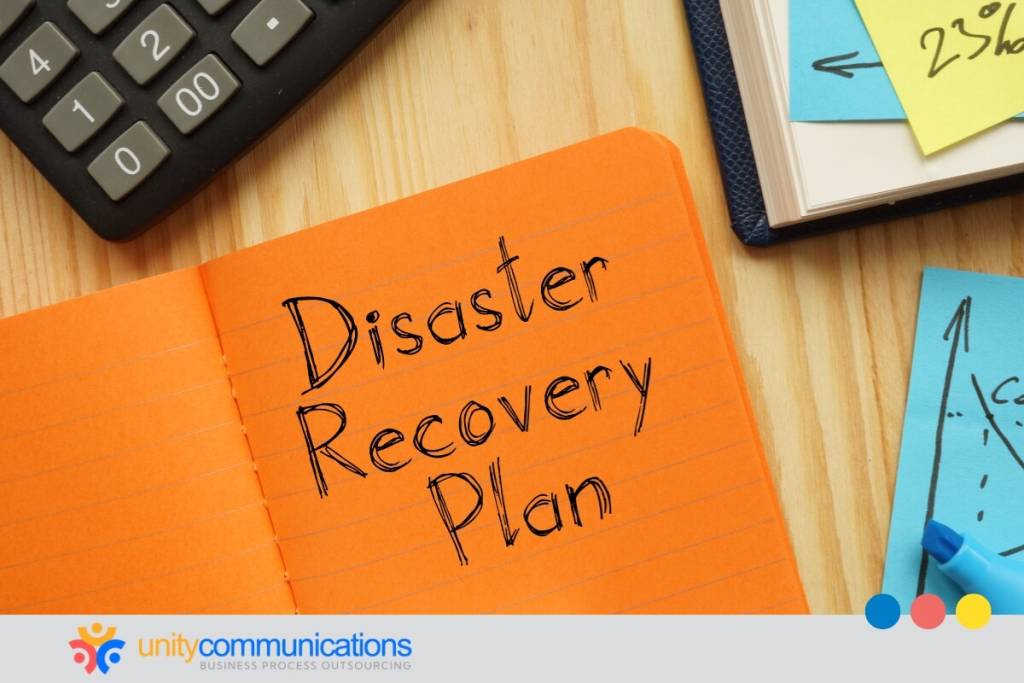Table of Contents
Disasters strike at any moment, often without warning. In a fast-paced, service-oriented industry such as business process outsourcing (BPO), calamities often result in operational delays, inefficiencies, and financial losses for both vendors and clients.
To mitigate such adverse impacts, BPO companies employ robust solutions for disaster recovery. They develop and implement comprehensive action plans to continue delivering high-quality services while addressing natural and manmade challenges.
This article explores resilience in the BPO industry, examining the strategies service vendors utilize to ensure disaster recovery and business continuity. Keep reading to learn actionable insights!
Crises impairing BPO operations and growth

In its latest report, the World Bank stated that global growth will remain stable at 2.6% in 2024. Climate change issues, debts, and geopolitical conflicts are among the crises contributing to the slow growth.
Although the BPO sector could expand at a compound annual growth rate (CAGR) of over 9% by 2030, providers might still experience a downturn. This is especially possible if they do not prepare ahead of time to address the harmful effects of the following issues:
- Technological disruptions, data breaches, and cybersecurity threats
- Global economic fluctuations
- Pandemics and health crises
- Political instability, regulatory changes, and wars
- Natural disasters (e.g., earthquakes, hurricanes, or floods)
- Human resource (HR) challenges (e.g., talent shortages and skill gaps)
- Environmental problems (e.g., pollution, drought, and global warming)
BPO solutions for disaster preparedness and recovery

Protiviti’s statistics show that business risks related to third parties increased the most in 2024. However, BPO vendors remain in high demand due to the cost savings, quality services, and scalable resources they offer.
To continue delivering on these promises, BPO vendors optimize cost-effective solutions for disaster recovery and preparedness. They employ these robust strategies and advanced technologies to ensure business continuity during emergencies:
- Third-party providers perform business impact analysis to specify critical processes, potential challenges, and recovery goals. The action assists them in developing incident response plans and prioritizing resources based on the possible effects of any calamity.
- Disaster recovery plans detail providers’ actions to prevent and mitigate various disruptions, such as natural disasters, cyberattacks, and social crises. These roadmaps include data backup procedures, employee assignments, and communication protocols.
- Proactive BPO companies perform risk assessments to track potential threats and measure their possible impact. The results inform their decisions and efforts to effectively create disaster recovery plans and allocate resources.
- BPO employees undergo training in disaster recovery procedures. Their employers hold regular drills to test the plan’s effectiveness, determine gaps, and ensure everyone understands their roles during a crisis.
- Secure data storage, backup, and recovery platforms help service providers keep and retrieve critical documents, especially during power outages. They use cloud-based solutions with encryption and real-time backup to let authorized personnel seamlessly access crucial data anytime and from anywhere.
- BPO firms leverage knowledge management systems and documentation best practices to capture, organize, and distribute critical information. These centralized repositories and standardized procedures help employees quickly access important insights on operational continuity methods, especially during calamities.
- Providers build and optimize redundant infrastructure to minimize downtime. They have backup power supplies, multiple network servers, and varied cloud-native platforms to ensure continuous operations, even if a single component fails.
- Centralized communication tools allow BPO vendors to maintain seamless connections during a crisis. Reliable collaboration platforms enable a smooth transition from on-site to remote work in emergencies.
- Service vendors develop and implement cybersecurity measures to combat online threats and minimize data breaches. Firewalls, intrusion detection systems, and multifactor authentication solutions help them protect confidential information from malicious actors.
- Complying with regulatory requirements and implementing robust risk management techniques guide BPO companies in preventing high violation costs and addressing legal uncertainties. They monitor regulatory changes and implement controls to avoid delays caused by potential legal issues.
Other BPO approaches to ensure business continuity

BPO companies also employ other approaches to ensure business continuity. These actions comprise organizational practices and strategic initiatives to maintain uninterrupted service delivery and financial performance.
The succeeding list is what BPO firms employ to expand their business recovery and preparedness before, during, and after emergencies:
- Diversifying service offerings enables providers to reduce reliance on a single client, industry, or process. Supporting multiple sectors allows them to better withstand demand fluctuations and mitigate the impacts of client loss. They adopt flexible staffing models and adaptive technologies to remain responsive and resilient during any situation.
- BPO firms work closely with clients to establish and implement well-structured disaster recovery and business continuity plans. Collaboration ensures they remain connected to continuously deliver superior output amid interruptions.
- Service vendors establish a clear plan to temporarily replace key personnel unavailable during disasters or incidents. They prepare a skeleton workforce that is easily deployable to handle critical functions during disruptions.
- In addition to a skeleton workforce, BPO companies build teams with diverse skill sets for better coverage and task redundancy. If a team member is inaccessible during emergencies, another employee with overlapping skills can step in to accomplish tasks and prevent backlogs.
- Evaluating and improving supply chain resilience enables third-party BPO companies to minimize vulnerabilities and attain undisrupted workflows. This process involves implementing supply chain visibility tools and developing contingency plans to help manufacturing providers avoid interruptions amid any crisis.
- BPO companies have appropriate insurance coverage for disasters, cyberattacks, and other business interruptions. This provides them with financial relief during incident response and recovery efforts.
The bottom line
Service providers help clients boost their operational efficiency during any circumstance. They offer support at competitive pricing to help clients reduce expenses while increasing productivity rates. However, vendors also encounter inefficiencies during natural or manmade crises that interrupt their delivery of these benefits.
Hence, BPO companies employ solutions for disaster recovery and business continuity. They exercise practical measures and maximize modern tools to ensure clients receive excellent service and avoid poor financial performance.
Let’s connect if you are seeking a disaster-resilient BPO partner. Unity Communications applies incident response strategies to prevent or mitigate the impacts of any crisis before it escalates. The award-winning provider houses skilled professionals and robust technologies to meet your daily requirements.




